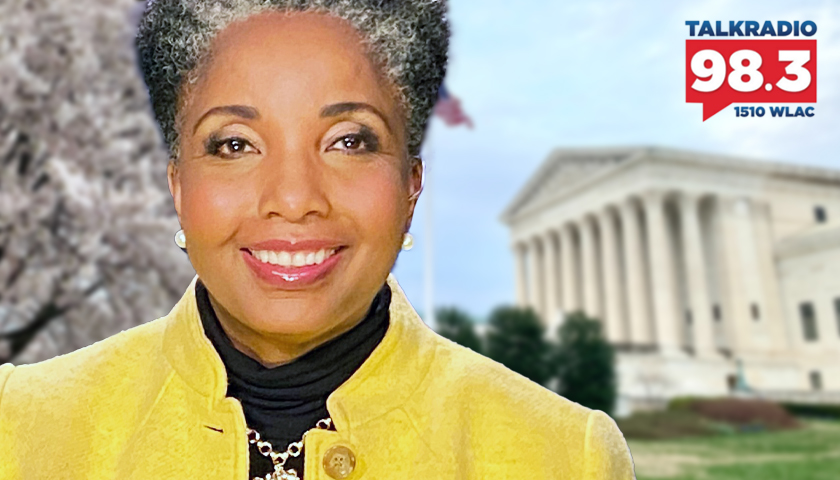Live from Music Row Monday morning on The Tennessee Star Report with Michael Patrick Leahy – broadcast on Nashville’s Talk Radio 98.3 and 1510 WLAC weekdays from 5:00 a.m. to 8:00 a.m. – host Leahy welcomed all-star panelist, Dr. Carol Swain in studio to talk about her qualifications and the petition for Supreme Court Justice nomination.
Leahy: We welcome in studio, all-star panelists Crom Carmichael and Dr. Carol M. Swain. Carol, tell us a little bit about your background.
Swain: I took my position with Princeton, in 1990, but I refused to apply for minority positions. And at that time, they would advertise a job and three minorities were supposed to compete against one another for a particular job.
I refused to apply for those jobs. I only apply for jobs in American politics. My field was Congress, and that’s what I did. And I got a job and a signing bonus.
Leahy: Congratulations, of course, Crom Carmichael, Carol Swain is a very accomplished person. Ph.D., five College degrees. Ph.D., University of North Carolina. Masters from Yale Law school. Your work has been cited in several Supreme Court cases, hasn’t it?
Swain: It has lower court decisions. And that was one of the reasons I decided to go to Yale Law School was that there was so much interest in my work in the legal community. And then a Masters in legal studies is like the first year of law school.
But when I got there, I realized that I don’t want to think like a lawyer. (Leahy chuckles) Because if you think like a lawyer, you lose whatever it is that has been important about my research. It has come because I’m not thinking like a typical lawyer.
Leahy: Yes, a good sign. By the way, Crom, in preparation for this segment, I looked at the Constitution and I sought to find out the qualifications to serve on the Supreme Court. Nowhere does it say you have to have a JD [juris doctorate] degree from a law school.
Carmichael: And I’m assuming that we have probably over the years, had some people on the Supreme Court who are not lawyers, but that’s very rare. Yeah.
Leahy: I don’t know if we have, actually, because when you look at it, Carol, in the early years, there weren’t law schools. People would read for the law.
Abraham Lincoln didn’t go to law school. He read for the law. He was a spectacularly good attorney, as you can see from his speeches and how he phrased things.
Swain: You know, Michael, one of the most serious mistakes I think that Democrats and Republicans make is that they sort of limit the pool disproportionately to the Ivy League. And I don’t care who they are. They are indoctrinated in the Ivy League in a particular kind of way that they tend not to be trustworthy.
You end up with Kavanaugh and Roberts and people whose decisions are so elitist that they’re not connected with the rest of us. And what I would like to see Supreme Court Justices picked from a wider range of schools.
Leahy: I’m all in favor of that. And as an Ivy League undergraduate, I take no offense. I take no offense at that because I agree with your sentiment.
Crom, I want to read this petition. It’s available to sign at The Tennessee Star, and we’d like to present this to President Biden in the next week or so.
Swain: What is this petition?
Leahy: It’s a petition that President Biden should nominate Dr. Carol Swain to the next associate justice on the United States Supreme Court. And you can go sign that right now. Just type in tennesseestar.com and Carol Swain is there.
It will pop up. Let me read this Crom and get your reaction. And this is only part of your smiling, Carol, because, you know, this is good stuff.
Swain: I can’t wait.
Leahy: We’re going to expand on this, but your picture is at the top of it and the Supreme Court behind.
Swain: Is it the picture I would approve of?
Leahy: You have tough standards. I think you’d approve of it. But we’ll switch it out if you don’t approve of it.
President Biden, we the undersigned, respectfully suggest – and fully support – Carol M. Swain, Ph.D. as your nominee to serve as the next associate justice on the United States Supreme Court.
Dr. Swain is an extraordinary and accomplished former professor of political science and professor of law at Vanderbilt University.
Before that, she was a tenured associate professor of politics and public policy at Princeton University’s Woodrow Wilson School of Public and International Affairs.
Hers is an inspiring story of grit, courage, and unwavering faith in the American Dream. Her knowledge of the law and wise legal mind would be a worthy addition to the high court.
Crom, your thoughts?
Carmichael: Then you should add, and by sheer coincidence, she also happens to fit your criteria.
Leahy: By sheer coincidence…
Carmichael: By sheer coincidence, she happens to fit your criteria. Now, my question, Carol, is given the fact that Biden has said that he’s going to discriminate against anyone who is not Black and female, if he were to nominate you, would you be uncomfortable accepting the nomination?
Swain: First of all, nominating a person on the basis of their race is a violation of the Civil Rights Act of 1964. It’s racially discriminatory. I think it probably violates the Equal Protection Clause.
And so we start off nominating a justice (Chuckles) using unconstitutional means would I accept it? If I thought it was going to happen? And if I thought that the alternative was an extremist, I would accept it because I care about all Americans. I care about our country. And my story is an American story, and I’m an American. And there’s one race, the human race.
Leahy: If we got 100,000 plus signatures on this and we gave this petition to Joe Biden, the President of the United States, I think he would take it and throw it in the wastebasket.
Carmichael: Of course.
Leahy: Okay. But, Carol, I have an idea. If we get 100,000 or whatever the number of petitions we get, you know, who confirms the justice of the Supreme Court? Members of the United States Senate.
So I think our next step will be, and this is us, not you. We’re going to send the petition to all the Republican members of the United States Senate and invite them to invite you to talk about the Supreme Court nomination. We have about 30 seconds.
Carmichael: I think that’s a great idea. But Carol has raised a fascinating question. And that is, what Biden has said. If he then follows through with what he has said, we can talk about this in the next segment is has he violated the Constitution?
Swain: Absolutely.
Carmichael: And then could he be sued by not a member of the Senate but could the process be sued by some other group on this question?
Leahy: What a great topic. I think we’re going to have to continue this when we get back.
– – –
Tune in weekdays from 5:00 – 8:00 a.m. to the Tennessee Star Report with Michael Patrick Leahy on Talk Radio 98.3 FM WLAC 1510. Listen online at iHeart Radio.
Photo “Carol Swain” by Carol M. Swain, PhD.





Supported Bill Lee – CHECK
Supported Hagerty for Senate – CHECK
Establishment candidate – CHECK
Qualified? NO!